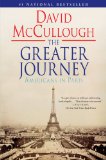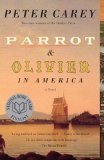Summary | Excerpt | Reviews | Beyond the book | Read-Alikes | Genres & Themes | Author Bio

Great Minds, the Gilded Age, and the Triumph of Evolution in America
by Barry WerthThe world is a dynamic and unstable place; violent conflicts erupt,
political differences divide our nation, a fantastic expansion of wealth gives
way to recession, perhaps depression. Though it may sound like a summary of the
week's headlines, this is the world as it appeared more than a century ago on
the cusp of The Gilded Age, the unalloyed era of American progress that serves
as backdrop for Barry Werth's new work of popular history. Offering a
fascinating window onto the battle of ideas that raged as United States was
catapulted to the status of a global power by its industrial might, Banquet
at Delmonico's will make an enjoyable read for anyone wanting to learn
about an eminently relevant era of U.S. history and have some fun in the
bargain.
The book's subtitle is Great Minds, the Gilded Age, and the Triumph of
Evolution in America, but it has very little to do with the controversy over
whether or not the world today is just as God created it a few thousand years
ago. In fact, the protagonist of the story is not Charles Darwin as one might
expect, but the English philosopher Herbert Spencer, the most famous and
influential proponent of what came to be called Social Darwinism. Spencer's
notion of social progress easily melded with Darwin's central insight – that
species evolve through a process of adaptive selection – and the resulting
theory saw a competition within and among human societies based on the "survival
of the fittest."
Banquet at Delmonico's tells a decade-long story of how Spencer's vision
survived its own mortal struggle, how that vision came to be adopted by many of
the most powerful figures of the day, and how those men molded it to fit their
aims and ideals in the fields of politics, finance and social morality. The
climactic triumph comes in the form of a banquet held in Spencer's honor at New
York's most elegant restaurant attended by a storied cast of characters who had
effectively shaped his ideas into the dominant social ideology of ascendant
industrial capitalism.
Werth succeeds in rendering this grand historical panorama personal almost to
the point of intimacy. For each of the featured characters a biographical
statement and photograph appears in the front matter as a sort of dramatis
personae. Indeed there is something theatrical about the pitched battles
fought across continents and decades between those on opposite sides of a grand
ideological divide, each with a great deal at stake beyond the ideas themselves.
The figures who loom largest in the story – Spencer himself, the American
preacher Henry Ward Beecher and the titan of American industry Andrew Carnegie –
are depicted in great detail down to their physical ailments and petty
self-obsessions. Heated conflicts over science, religion and philosophy emerge
from these close-range depictions, making Banquet read less like a
historical tract and more like a detective story.
Ultimately, though, Banquet at Delmonico's is worth reading because it
narrates in a compelling way a struggle so eerily similar to the one unfolding
before our eyes at this very moment. Behind each successive debate over bailing
out financial institutions or sealing our national borders there is a social
philosophy – a set of ideas that dictates what society is "really like" and how
it should be governed. What better way to get a fresh take on the current
competition of social ideologies than by reading about how it played out a
hundred years ago?
![]() This review was originally published in The BookBrowse Review in January 2009, and has been updated for the
April 2011 edition.
Click here to go to this issue.
This review was originally published in The BookBrowse Review in January 2009, and has been updated for the
April 2011 edition.
Click here to go to this issue.

If you liked Banquet at Delmonico's, try these:

by David McCullough
Published 2012
The Greater Journey is the enthralling, inspiring - and until now, untold - story of the adventurous American artists, writers, doctors, politicians, architects, and others of high aspiration who set off for Paris in the years between 1830 and 1900, ambitious to excel in their work.

by Peter Carey
Published 2011
From the two-time Booker Prize–winning author comes an irrepressibly funny new novel set in early nineteenth-century America.
Your guide toexceptional books
BookBrowse seeks out and recommends the best in contemporary fiction and nonfiction—books that not only engage and entertain but also deepen our understanding of ourselves and the world around us.